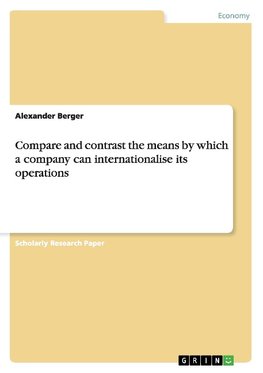
-
 Anglický jazyk
Anglický jazyk
Compare and contrast the means by which a company can internationalise its operations
Autor: Alexander Berger
Research paper from the year 2011 in the subject Business economics - Business Management, Corporate Governance, grade: 85%, University of Sunderland, course: International Business Environment (PGBM04), language: English, abstract: In terms of management... Viac o knihe
Na objednávku, dodanie 2-4 týždne
17.55 €
bežná cena: 19.50 €
O knihe
Research paper from the year 2011 in the subject Business economics - Business Management, Corporate Governance, grade: 85%, University of Sunderland, course: International Business Environment (PGBM04), language: English, abstract: In terms of management philosophies, companies can be categorized as ethnocentric (homemarket oriented), polycentric (oriented toward individual foreign markets), regioncentric or geocentric (oriented toward larger areas, even the global market place) (Czinkota, 1999, pp.
395). Nevertheless, the world economy is more and more characterised by an increased internationalisation in which companies see a chance to improve their long-term competitiveness, to increase their profitability as well as to balance the economic cycle of the home market by diversify the risk internationally. In addition, there are non-economic motives such as to obtain power and influence as well as to gain prestige. However, to internationalise successfully companies must create a strategy of internationalisation. Part of this strategy is for instance the choice of the target market and the timing of entering a market. In addition, a strategy can be created based on the control aspect, the capital employed as well as how much risk is involved in internationalising the operations. Referring to this,there are several modes a company can choose to internationalise its operation, which can be divided into equity and non-equity modes. In general, non-equity modes such as franchising, exporting, etc. are less
expensive and risky than equity modes. For companies with little international experience, non-equity modes provide a good start to begin their operations internationally. Equity modes such as Foreign Direct Investments provide the most control of the business and as the name already indicates there is a substantial equity participation involved. However, when creating an international strategy companies must consid
- Vydavateľstvo: GRIN Verlag
- Rok vydania: 2011
- Formát: Paperback
- Rozmer: 210 x 148 mm
- Jazyk: Anglický jazyk
- ISBN: 9783640937837











